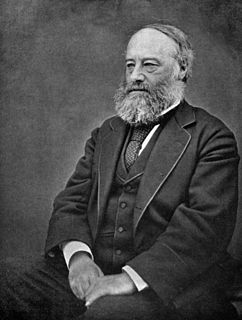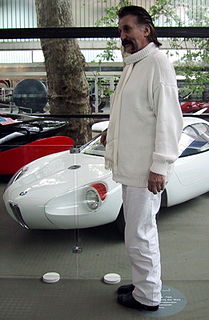A Quote by Henry Brougham, 1st Baron Brougham and Vaux
The same Being that fashioned the insect, whose existence is only discerned by a microscope, and gave that invisible speck a system of ducts and other organs to perform its vital functions, created the enormous mass of the planet thirteen hundred times larger than our earth, and launched it in its course round the sun, and the comet, wheeling with a velocity that would carry it round our globe in less than two minutes of time, and yet revolving through so prodigious a space that it takes near six centuries to encircle the sun!
Quote Topics
Being
Carry
Centuries
Comet
Course
Created
Earth
Enormous
Existence
Functions
Gave
Globe
Hundred
Hundred Times
Insect
Invisible
Larger
Less
Mass
Microscope
Minutes
Near
Only
Organs
Other
Our
Perform
Planet
Prodigious
Revolving
Round
Same
Six
Space
Speck
Sun
System
Takes
Than
Thirteen
Through
Time
Times
Two
Velocity
Vital
Wheeling
Whose
Would
Related Quotes
In this model, the sun is a very tiny speck of dust indeed-a speck less than a three-thousandth of an inch in diameter ... Think of the sun as something less than a speck of dust in a vast city, of the earth as less than a millionth part of such a speck of dust, and we have perhaps as vivid a picture as the mind can really grasp of the relation of our home in space to the rest of the universe.
Absolute space, that is to say, the mark to which it would be necessary to refer the earth to know whether it really moves, has no objective existence.... The two propositions: "The earth turns round" and "it is more convenient to suppose the earth turns round" have the same meaning; there is nothing more in the one than in the other.
The earth in its rapid motion round the sun possesses a degree of living force so vast that, if turned into the equivalent of heat, its temperature would be rendered at least one thousand times greater than that of red-hot iron, and the globe on which we tread would in all probability be rendered equal in brightness to the sun itself.
The earth is round, all the heavenly bodies are round; they all move on round or elliptical orbits. This same image of circular globe-shaped mini worlds orbiting around each other follows us right down to the microcosmos. We are even aroused by round forms in species propagation related eroticism. Why should I join the straying mass who want to make everything angular? I am going to pursue Galileo Galilei's philosophy: my world is also round.
The following passage is one of those cited by Copernicus himself in his preface to De Revolutionibus: "The Syracusan Hicetas, as Theophrastus asserts, holds the view that the heaven, sun, moon, stars, and in short all of the things on high are stationary, and that nothing in the world is in motion except the earth, which by revolving and twisting round its axis with extreme velocity produces all the same results as would be produced if the earth were stationary and the heaven in motion. . . ."
The order and harmony of the Western world, its most famous achievement, and a laboratory in which structures of a complexity as yet unknown are being fashioned, demand the elimination of a prodigious mass of noxious by-products which now contaminate the globe. The first thing we see as we travel round the world is our own filth, thrown into the face of mankind.
Let me put it in a rather larger picture framework. Let's go to the longest time frame, the time frame of the life of our sun. As a star, our sun is about halfway through its life cycle. In the long run, we only have a couple of billion more years likely that we can inhabit this planet. By that time, we're going to have to be out of here before our sun dies. Now, I don't think we need to wait that long, and we certainly shouldn't wait that long. At the moment, we are not on a sustainable path.
Deep beneath the surface of the Sun, enormous forces were gathering. At any moment, the energies of a million hydrogen bombs might burst forth in the awesome explosion.... Climbing at millions of miles per hour, an invisible fireball many times the size of Earth would leap from the Sun and head out across space.
So much of what we said sounded crazy, yet none of it was false... as if two theoretical physicists stood on stage to say that when we travel near lightspeed, we get younger than nontravellers; that a mile of space next to the sun is differnt than a mile of space next to the earth because the sun-mile space is curved more than the the earth-mile. Silly ideas, worth the admission price in smiles, but they're true. Is high-energy physics interesting because it's true or because it's crazy?
If we can avoid disaster for the next two centuries, our species should be safe as we spread into space. If we are the only intellegent beings in the galaxy we should make sure we survive and continue. . . . Our only chance of long-term survival is not to remain inward looking on planet Earth but to spread out into space. We have made remarkable progress in the last hundred years. But if we want to continue beyond the next hundred years, our future is in space.
Because God is not only infinitely greater and more excellent than all other being, but he is the head of the universal system of existence; the foundation and fountain of all being and all beauty; from whom all is perfectly derived, and on whom all is most absolutely and perfectly dependent; of whom, and through whom, and to whom is all being and all perfection; and whose being and beauty are, as it were, the sum and comprehension of all existence and excellence: much more than the sun is the fountain and summary comprehension of all the light and brightness of the day.











































